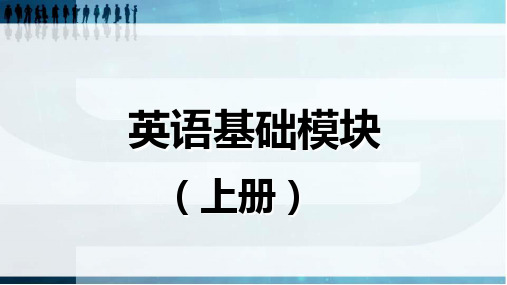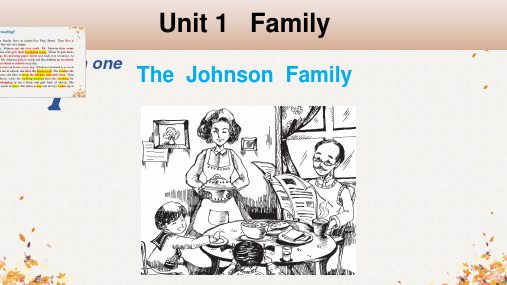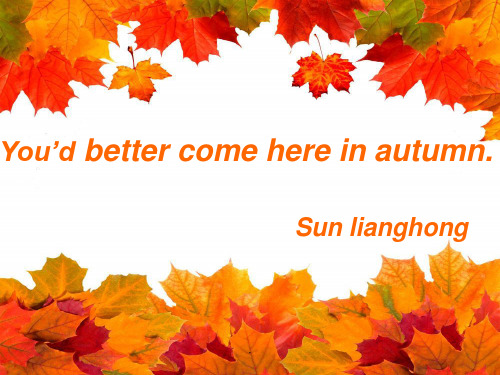中职英语第一册unit 1PPT课件
合集下载
中职英语基础模块unit 1PPT课件

5 Little Tom can’t remember new words he has learnt.
第14页/共44页
Dialogue
(R=Ralph, J=Julie) R: Hi, Julie! I’ve heard that you are good at English. So please do me a favor, will you? J: Of course. What’s the matter? R: I am poor in English learning and I don’t know how to improve it. Could you give me some advice? J: Sure. Let’s start from pronunciation. How about your pronunciation? R: It’s too bad and is really my big headache. I can’t make myself understood by foreigners. J : That’s because your pronunciation is not correct. You can listen to some English songs and learn to sing them. It may help a lot. R: That sounds great. I’ll try. Thanks a lot. J : Don’t mention it.
Good cookies could be cooked by a good cook, if a good cook could cook good cookies. I don't know why Joan showed a yellow coat to the goat in the snow. Tom has got a lot of dots on his pocket. If he wants to wash off the dots, he will use a pot of hot water.
第14页/共44页
Dialogue
(R=Ralph, J=Julie) R: Hi, Julie! I’ve heard that you are good at English. So please do me a favor, will you? J: Of course. What’s the matter? R: I am poor in English learning and I don’t know how to improve it. Could you give me some advice? J: Sure. Let’s start from pronunciation. How about your pronunciation? R: It’s too bad and is really my big headache. I can’t make myself understood by foreigners. J : That’s because your pronunciation is not correct. You can listen to some English songs and learn to sing them. It may help a lot. R: That sounds great. I’ll try. Thanks a lot. J : Don’t mention it.
Good cookies could be cooked by a good cook, if a good cook could cook good cookies. I don't know why Joan showed a yellow coat to the goat in the snow. Tom has got a lot of dots on his pocket. If he wants to wash off the dots, he will use a pot of hot water.
中职英语第一册课件

winter cold
Step 3 learn new dialogue(对话)
Decide true or false.
F • 1.It is always hot in spring. ( ) T • 2.Spring is the best season in jinan.( ) F • 3.You’d better come here in winter.( ) T • 4. Mary decided to visit jinan in autumn.( )
Step 5 Ricite it i Nhomakorabea pairs.(背诵)
A: I’d like to … How’s …? B: hot , cold A: the best season B: It’s autumn… the best season .
neither…nor , You’d better... A: All right.Thank you.
Step 6 Make their own diagues.
(角色扮演)
Find out the best time to visit Harbin,Qingdao,Hanzhou and Sanya.
Harbin
Hangzhou
Qingdao
Sanya
I like…best. Because I can…
Step 2 new words(单词)
sunny
windy
rainy
smoke +fog=smog
Guess,what season is it?
summer hot
It is hot. It’s not cool. It’s wet. The sun shines and shines. We can swim in the sea.
Step 3 learn new dialogue(对话)
Decide true or false.
F • 1.It is always hot in spring. ( ) T • 2.Spring is the best season in jinan.( ) F • 3.You’d better come here in winter.( ) T • 4. Mary decided to visit jinan in autumn.( )
Step 5 Ricite it i Nhomakorabea pairs.(背诵)
A: I’d like to … How’s …? B: hot , cold A: the best season B: It’s autumn… the best season .
neither…nor , You’d better... A: All right.Thank you.
Step 6 Make their own diagues.
(角色扮演)
Find out the best time to visit Harbin,Qingdao,Hanzhou and Sanya.
Harbin
Hangzhou
Qingdao
Sanya
I like…best. Because I can…
Step 2 new words(单词)
sunny
windy
rainy
smoke +fog=smog
Guess,what season is it?
summer hot
It is hot. It’s not cool. It’s wet. The sun shines and shines. We can swim in the sea.
中职英语基础模块上册unit1PPT课件

你呢
I'm fine,too.Tha
nk you! 我也是,谢谢
LOREM IPSUM DOLOR
Nice to meet you! 很高兴见到你 Nice to meet you,too! 也很高兴见到你
• Notes:
•
• 1. Introductions are important because a proper introduction will leave a good first impression upon others.
Between Acquaintances [ə´kweıntəns ]
Hello. Hi. How are you? How are you doing? How’s it going? What’s up? What’s new? Hi, there
How are you?
• Good, pretty good, great, fantastic, perfect • Not bad • So so • Not good • Bad, I am not in a good mood • I am in a blue mood • Terrible, awful
❖meet
❖ v.遇见;汇合;迎接
❖look
❖ v.看;瞧;看起来,显得
look at
看
❖class
❖ n.班级;课节
❖a lot of ❖ 许多+可数名词
例句:这有许多花。 eg. There are a lot of flowers.
❖read
❖ v.读;阅读
reading room 阅览室
例子:读书
nisi ut aliquip ex ea commodo consequat.
I'm fine,too.Tha
nk you! 我也是,谢谢
LOREM IPSUM DOLOR
Nice to meet you! 很高兴见到你 Nice to meet you,too! 也很高兴见到你
• Notes:
•
• 1. Introductions are important because a proper introduction will leave a good first impression upon others.
Between Acquaintances [ə´kweıntəns ]
Hello. Hi. How are you? How are you doing? How’s it going? What’s up? What’s new? Hi, there
How are you?
• Good, pretty good, great, fantastic, perfect • Not bad • So so • Not good • Bad, I am not in a good mood • I am in a blue mood • Terrible, awful
❖meet
❖ v.遇见;汇合;迎接
❖look
❖ v.看;瞧;看起来,显得
look at
看
❖class
❖ n.班级;课节
❖a lot of ❖ 许多+可数名词
例句:这有许多花。 eg. There are a lot of flowers.
❖read
❖ v.读;阅读
reading room 阅览室
例子:读书
nisi ut aliquip ex ea commodo consequat.
中职英语基础模块上册unit ppt课件

Kissing hands
吻手礼:吻手礼源于古代维京人用手向其日耳曼君 主递礼物的风俗,流行于欧美上层社会,是一种仅对贵 族已婚妇女实施的礼节。吻手礼一般在室内举行,并且 仅限于手腕以下部位,一般是指背。
cross one's
hands 双手合十:
这种礼仪多见于 信奉佛教的国家,比如说泰国。 泰国人见面时往往低头问候, 并将双手合十于胸前。小辈见 长辈双手举到前额高度,平辈 到鼻子高度,而长辈还礼则只 需到胸前即可。另外,泰国认 为头部是神圣的,不能随意摸 别人的头。
你呢
I'm fine,too.Tha
nk you! 我也是,谢谢
LOREM IPSUM DOLOR
Nice to meet you! 很高兴见到你 Nice to meet you,too! 也很高兴见到你
• Notes:
•
• 1. Introductions are important because a proper introduction will leave a good first impression upon others.
•.
Warm-up
Look at the picture and tick. Emily and Jenny meet each other for the first time. Tick what they would say.
( ) 1. Hi, Jenny! ( ) 2. Good morning Jenny. Nice to meet you. ( ) 3. Hello, I’m Emily. ( ) 4. Bye. See you later. ( ) 5. How do you do? ( ) 6. Thank you!
中职英语第一册整理PPT课件

整理版课件
22
Sanya
整理版课件
23
I like…best. Because I can…
summer: swim, eat ice-cream,
wear T-shirt…
winter: make a snowman, skate…
spring: fly kites, have a picnic, play
A:W_h_a_t_is the _b_e_sst eason in Jinan?
B: It’s_a_u_t_u_m__n.Autumn is the best season in
jinan.It’sn_e_i_t_h_ehrot n__o_r cold.You’d _b_e_tter
come here in autumn.
中职英语第一册整理ppt课件
You’d better come here in autumn.
Sun lianghong
整理版课件
1
整理版课件
2
整理版课件
3
整理版课件
4
整理版课件
5
Step 1 lead-in(导入)
1.How many seasons are there in a year? Four.
整理版课件
18
Step 6 Make their own diagues.
(角色扮演)
Find out the best time to visit Harbin,Qingdao,Hanzhou and Sanya.
整理版课件
19
Harbin
整理版课件
20
Hangzhou
整理版课件
21
中职英语1 课件ppt课件ppt

Vocabulary knowledge
Job-related vocabulary
introduce common job-related English words and phrases that are useful for students' future careers.
Basic greetings and introductions
introduce common English expressions that can be used to
describe daily activities.
03
Conversational skills
help students improve their English conversation skills,
teach students the appropriate ways to greet and introduce themselves in English.
Common expressions for daily communication
introduce common English expressions that can be used in daily communication.
Grammar knowledge
Simple present tense
introduce the usage and structure of the simple present tense, including its context and meaning.
Present continuous tense
Speaking and Listening
高教版中职英语(基础模块 第1册)Unit 1《Nice to meet you!》ppt课件1

•
与此相反,如果坐在前面,首先心情就很不同,自己比别人靠前的感觉让你听课时的态度变得更积极。与老师眼神交会的机会增多,感觉就好像是老师在做一对一个人辅导。
•
有的学生恰恰就是因为这一点,讨厌坐在前面。和老师眼神交会非常有负担,稍微做点儿小动作就会被老师发现,非常不方便。而且坐在前面说不定还会被问到一些难以回答的问题。
是老师在上课时补充讲解的,如果不听讲很可能就会错过这些重点。
•
所以,上课的时间一定要专注于课堂,决不能打开别的习题集去学习,这样才是高效率的学习,才是提高成绩最快的方法。因此,困难也要先听课,那对你将来的自学一定会很有帮助,哪怕你只是记住了一些经常出现的术语,上课的内容好像马上就忘光
了,但等到你日后自己学习的时候,也能让你回想起很多内容。
2019/10/18
教学资料精选
7
谢谢欣赏!
2019/10/18
教学资料精选
8
Homework
Copy these new words one line. Copy these new expressions one time. Read the dialogue with your partner.
曾海卿
大连交通技师学院
编者语
• 要如何做到上课认真听讲?
•
我们都知道一个人的注意力集中时间是有限的,一节课45分钟如何保持时时刻刻都能认真听讲不走神呢?
Unit 1 Nice to meet you
大连交通技师学院 曾海卿
New words for Dialogue
1、introduce v. 介绍 Let me introduce a new friend to you. 2、This is David. This is Li Xiao.
职高英语第一册Unit1_Greetings_and_Introductions(课堂PPT)

Task 5
Role Play 角色扮演
➢Role A Zhang Li greets the teacher in the morning. ➢Role B The teacher replies. ➢Role A ZhangLi greets a classmate in the afternoon. ➢Role B The classmate replies.
1. introduce oneself 自 我介绍
2. introduce A to B 把A 介绍给B
greet [grɪːt] v.
say hello to sb 打招呼,问好 Can you greet people in English?
你会用英语打招呼吗?
greet people in English
Summary
A
B
Homework
1. 抄写单词十遍,加上中文意思,准备下次课听写。 2. 背诵Task 3 句型。 3. 完成练习册p1-3练习。
➢ boss [ bɒs]
负责,管理
➢ a person who is in charge of others at
work
➢老板,头目
➢ This iΒιβλιοθήκη my boss, Mr Zhang.
➢ 这是我的老板张先生。
➢computer [kəmˈpjuːtə ]
➢an electronic device for storing and processing
用英语打招呼
spell [spel] v.
How do you spell your name? 你的名字如何拼写? Spell the word,please.
中职英语第一册unit1 Nice People,Nice Place课件

Beijing Paris New York Egypt Sydney
modern clean busy romantic old Friendly nice warm kind polite
Where did Susan go? Does she like that place?
Listening
Bob: Oh, it must be very busy and noisy. Susan: Yes. But I like it. People there are nice and
friendly.
Listening
Listen and tick the answers. How does Susan find London?
Nina / America
A: Where are you from? B: I’m from Italy.
Ross / France
beautiful Chengdu: clean
What do you think of Chengdu?
Words
beautiful modern clean old busy noisy quiet Romantic(浪漫的) Crowded(拥挤的)
He is an American.
Skill Practice
Pair work. Ask and answer questions.
Monica / Britain
A: Where are you from? B: I’m from Britain.
A: Where are you from? B: I’m from China.
Bob: Were there a lot of tourists? Susan: Yes, there were thousands of tourists from all
modern clean busy romantic old Friendly nice warm kind polite
Where did Susan go? Does she like that place?
Listening
Bob: Oh, it must be very busy and noisy. Susan: Yes. But I like it. People there are nice and
friendly.
Listening
Listen and tick the answers. How does Susan find London?
Nina / America
A: Where are you from? B: I’m from Italy.
Ross / France
beautiful Chengdu: clean
What do you think of Chengdu?
Words
beautiful modern clean old busy noisy quiet Romantic(浪漫的) Crowded(拥挤的)
He is an American.
Skill Practice
Pair work. Ask and answer questions.
Monica / Britain
A: Where are you from? B: I’m from Britain.
A: Where are you from? B: I’m from China.
Bob: Were there a lot of tourists? Susan: Yes, there were thousands of tourists from all
中职英语1Unit1ppt课件

There is a table in the room. 房间里有一张桌子。
There is a little water in the bottle. 瓶子里有一点水。
(2)如果句子的主语是复数名词时,be动词就用are。 如:
There are some pencils on the chair. 椅子上有一些铅笔
.
就近原则
(3)如果有两个或两个以上的主语时,be动词 要和最靠近它的那个主语在数上保持一致。如:
• There is a pen and some books on the desk. 书桌上有一支钢笔和一些书。
• There are some books and a pen on the desk.
主语是一句话的中心,表示所说的是什么,其位 置一般放在句首,英语中主语一般不省略。主语 主要由名词、动名词、代词或起名词作用的短语 货从句来充当。 eg: Li Lei is a Chinese boy .(Li lei 是名词,作主语) eg: He is from England .(He是代词,作主语) 系动词(Link verb) 简单的说,将主语和表语联系在一起,并构成一
Unit1 Our new school
.
Warming up
• How do people greet each other when they meet on campus?
Good morning,Nancy.
G. ood morning,Wang Lin.
Warming up
• How do friends greet each other when they meet ?
• There are some shoes under the bed.(一 般疑问句) Are there any shoes under the bed? Yes, there are. / No, there aren’t.
There is a little water in the bottle. 瓶子里有一点水。
(2)如果句子的主语是复数名词时,be动词就用are。 如:
There are some pencils on the chair. 椅子上有一些铅笔
.
就近原则
(3)如果有两个或两个以上的主语时,be动词 要和最靠近它的那个主语在数上保持一致。如:
• There is a pen and some books on the desk. 书桌上有一支钢笔和一些书。
• There are some books and a pen on the desk.
主语是一句话的中心,表示所说的是什么,其位 置一般放在句首,英语中主语一般不省略。主语 主要由名词、动名词、代词或起名词作用的短语 货从句来充当。 eg: Li Lei is a Chinese boy .(Li lei 是名词,作主语) eg: He is from England .(He是代词,作主语) 系动词(Link verb) 简单的说,将主语和表语联系在一起,并构成一
Unit1 Our new school
.
Warming up
• How do people greet each other when they meet on campus?
Good morning,Nancy.
G. ood morning,Wang Lin.
Warming up
• How do friends greet each other when they meet ?
• There are some shoes under the bed.(一 般疑问句) Are there any shoes under the bed? Yes, there are. / No, there aren’t.
中职英语第三版第一册Unit1 Lesson1 课件

at 用于小时、刻、分钟、秒之前以及一些固定的 短语中。
She goes shopping at ten o’clock and gets back at eleven. 她10 点钟去购物,11 点回家。 at half past four(在4 点半),at six o’clock(在6 点 钟)。 at dawn/ noon/ evening/night/midnight(在黎明/ 中午/ 晚上/ 夜里/ 半夜)。
1.The Johnson family lives at ninety-five Park Street. 2.Mr,Johnson does some running. 3.Because she likes to keep the kitchen tidy and clean. 4.The children come home from school by school bus. 5.The children always go to bed at nine.
home 家,在家
Mrs. Johnson stays at home every day.约翰逊夫ቤተ መጻሕፍቲ ባይዱ每天都呆在家。
In the evening, the children come home from school by school bus .
晚上孩子们乘校车回家。 home 既可用作名词,又可用作副词。 用作名词时,经常用于短语at home。 I’ll have to stay at home this evening. 我今晚得待在家里。 用作副词时,它前面不能加to 等介词。 They arrived home early. 他们很早就回家了。 When he gets back, he always brings his morning paper home. 他 回家时总是把晨报带回家。 回家go/come/return home〔正〕
中职英语第一册ppt课件ppt课件ppt课件

Email Reading
掌握职场沟通技巧
通过阅读职场邮件,学生可以了解职场沟通规范,学习如何撰写正式的商务邮件,提高职场沟通技巧 。
05
Writing skills
BIG DATA EMPOWERS TO CREATE A NEW
ERA
Letter writing
格式规范
掌握商务信函的标准格式,包括称呼、正文 、结尾敬语和签名。
03
Simple past tense
introduce the formation and usage of the simple past tense, including the subject, auxiliary verb, and past participle.
Vocabulary knowledge
Farewells
This section teaches common farewell expressions like "Goodbye", "See you later", and "Take care". It also covers how to bid farewell to people in various scenarios, such as leaving work or parting ways.
02
Present continuous tense
explain the formation and usage of the present continuous tense, including the subject, auxiliary verb, and present participle.
中职英语第一册完整ppt课件

.
autumn
cool
It’s cool. It’s not hot. It’s dry.
Leaves fall and fall. They’re
yellow.
.
It’s cold. It’s not warm. It’s dry. The wind blows and blows. We can make a snowman.
write a short passage about your favorite season.
.
·
.
知识回顾 Knowledge Review
.
Step 4 Read and find out key sentences. (重点分析)
1. I’d like to… 2. How’s the weather there?
What’s the weather like there? 3.What is the best season in jinan? 4.It’s neither hot nor cold. 5.You’d better come here in autumn.
B: It’s_a_u_t_u_m__n.Autumn is the best season in
jinan.It’sn_e_i_t_h_ehrot n__o_r cold.You’d _b_e_tter
come here in autumn.
A:All right.Thank you.
.
.
Homework
summer: swim, eat ice-cream,
wear T-shirt…
winter: make a snowman, skate…
autumn
cool
It’s cool. It’s not hot. It’s dry.
Leaves fall and fall. They’re
yellow.
.
It’s cold. It’s not warm. It’s dry. The wind blows and blows. We can make a snowman.
write a short passage about your favorite season.
.
·
.
知识回顾 Knowledge Review
.
Step 4 Read and find out key sentences. (重点分析)
1. I’d like to… 2. How’s the weather there?
What’s the weather like there? 3.What is the best season in jinan? 4.It’s neither hot nor cold. 5.You’d better come here in autumn.
B: It’s_a_u_t_u_m__n.Autumn is the best season in
jinan.It’sn_e_i_t_h_ehrot n__o_r cold.You’d _b_e_tter
come here in autumn.
A:All right.Thank you.
.
.
Homework
summer: swim, eat ice-cream,
wear T-shirt…
winter: make a snowman, skate…
Unit 1.中职类基础英语ppt课件

heard.
Driving ideas are the power we were given when we were
born; they make us realize that we can create history. They
can enlighten an area and create a
Sarah: Hi, Andrew. How nice to see you! What are you reading?
Andrew: Oh, I am reading the history of BMW. It’s cool. Sarah: That sounds interesting. I’m interested in the BMW
Andrew: Yes, you are right. This is a kind of explanation, too. The origin of the logo is still in dispute.
Sarah: I see. Thank you so much.
Andrew: It’s my pleasure.
Until children car passengers are tall enough to (put,
w√ear, get) a normal seat belt, they need to use a child seat.
The importance of this has been highlighted recently by
challenge. For group, is legend. For us, is everything.
—— Ferrari
中职英语1册课件(完整版)

do sቤተ መጻሕፍቲ ባይዱorts
walk to school
Listening and Speaking
Learn these words and expressions.
different from
不同于
high school
中学
skill
n. 技能,技巧
the whole day
整天
machine
n. 机器
Tom: When do you start your classes? Claire: Half past eight.
Tom: What do you do after classes? Claire: I often do sport.
Tom: Good for you.
Warming up
1. How many hours do you study in the classroom every day? 2. How many student in your class? 3. Do you go to workshops or factories to learn practical skills?
simple present tense.
Contents
1
Warming up
2
Reading
3
Post-Reading
4
Practice of word and
expressions
5
Skill Practice
6
Listening Speaking
Writing
7
Grammar
8
New words &
中职第一册Unit1 ReadingPPT课件

填空题
1. I have a friend _w_h_o_/_th_a_t_ likes listening to classical music.
2. Yesterday Emily was wearing the new dress _w_h_i_c_h_/t_h_a_t_ I gave her.
Europe handshake Russia hug bow waist India palm nod
greeting 问候(语) Europe 欧洲
greet
问候
handshake 握手
notice 注意到;通知 Russia 俄罗斯
rule
规则
hug
拥抱
complicated复杂的
bow
鞠躬
A.that B. if C. when D. whether
2.The reason why he failed is ________he was too
careless.
A.because B. that C. for
D. because of
He was ill. That’s why he was sent to the hospital.
She spends 10 percent _o_f_h_e_r_m_o_n_e_y_ in _b_u_y_i_n_g_ clothes. She likes to send _t_ex_t_m__e_ss_a_g_e_s and _t_a_lk__w_it_h_ her friends, so her mobile phone __b_i_ll___ is _p_re_t_ty__b_ig_. She __ta_k_e_s_a_b_u_s___ to school everyday. _T_r_a_n_sp_o_r_t_at_io_n__ is about five percent of her money.
中职英语1(基础模块)unit1 PPT

• I see. 我明白了。 • e.g. • — Ben is my first name. Brown is my last name. • Ben是我的名,Brown是我的姓。 • — I see.
Where are you from? 你是哪儿人? e.g. — Where are you from? 你是哪儿人? — I’m from Beijing. 我是北京人。 — Where is he from? 他是哪儿人?
Tel: 022-84212663
E-mail: sarasmith@ Fucheng Vocational School Gao Bin Teacher Address: No. 28 Fucheng Street, Beijing Tel: 010-68253300 E-mail: gaobin0819@
Activity 15
No. 28 Furong Street, gaobin0819@sohu. 0731-85330011 com Changsha,Hunan
No. 37 Huayuan Street, Beijing lwz0701@ 010-88514618
Nice to meet you. 意为“见到你很高兴。” meet 在这里意为“见到,遇到”。 e.g. meet a friend 遇见一个朋友 We often meet some difficulties in our life. 在生活中我们经常会遇到一些困难。
Nice to meet you, too. 意为“见到你我也很高兴”。 nice 在这里意为“好,不错”。 e.g. It’s a nice party. 这是个不错的晚会。 That’s a nice picture. 那是幅很好的画。
Where are you from? 你是哪儿人? e.g. — Where are you from? 你是哪儿人? — I’m from Beijing. 我是北京人。 — Where is he from? 他是哪儿人?
Tel: 022-84212663
E-mail: sarasmith@ Fucheng Vocational School Gao Bin Teacher Address: No. 28 Fucheng Street, Beijing Tel: 010-68253300 E-mail: gaobin0819@
Activity 15
No. 28 Furong Street, gaobin0819@sohu. 0731-85330011 com Changsha,Hunan
No. 37 Huayuan Street, Beijing lwz0701@ 010-88514618
Nice to meet you. 意为“见到你很高兴。” meet 在这里意为“见到,遇到”。 e.g. meet a friend 遇见一个朋友 We often meet some difficulties in our life. 在生活中我们经常会遇到一些困难。
Nice to meet you, too. 意为“见到你我也很高兴”。 nice 在这里意为“好,不错”。 e.g. It’s a nice party. 这是个不错的晚会。 That’s a nice picture. 那是幅很好的画。
- 1、下载文档前请自行甄别文档内容的完整性,平台不提供额外的编辑、内容补充、找答案等附加服务。
- 2、"仅部分预览"的文档,不可在线预览部分如存在完整性等问题,可反馈申请退款(可完整预览的文档不适用该条件!)。
- 3、如文档侵犯您的权益,请联系客服反馈,我们会尽快为您处理(人工客服工作时间:9:00-18:30)。
的)
❖polite(有礼貌的) ❖hardworking(勤奋的) ❖helpful
Follow the example and make dialogues
❖A: I’m back from Hangzhou? ❖B: What do you think of Hangzhou? ❖A: It’ s a very beautiful place. ❖B: Do you like the people there? ❖A: Yes. They are very nice.
Bob: Oh, it must be very busy and noisy. Susan: Yes. But I like it. People there are nice and
friendly.
Listening
Listen and tick the answers. How does Susan find London?
√ America √ beautiful √ Chinese merican √ Britain √ clean √ France √ modern
Listen to the dialogue and answer.
Bob: Hi, Susan. Long time no see. Susan: Yes. I’m just back from London.
Bob: How did you find it? Susan: It’s a big city.
2
Make dialogues according to the listening material
3
Free talk the feeling about the different people and places
My Progress Check
Words I have learned in this lesson are:
Beijing London Paris New York ❖beautiful clean modern(现代的)
romantic(浪漫的 ) busy noisy(吵闹的) quiet old ❖ Crowded
❖friendly ❖nice ❖kind(友好的) ❖warm(热情的;温暖的) ❖warm-hearted(热心
Teaching Procedures
friendly
Where is he from? He is from America.
He is an American.
Skill Practice
Pair work. Ask and answer questions.
Monica / Britain
Bob: Were there a lot of tourists? Susan: Yes, there were thousands of tourists from all
over the world—Americans, Chinese, French, Italians, Australians and many others.
UNIT 1
Nice People, Nice Places
Jiange Vocational High School
Teaching Procedures
Warming up
Teaching Procedures
Shanghai China Chinese
Teaching Procedures
❖Beijing Paris New York Egypt Sydney
❖modern clean busy romantic old ❖Friendly nice warm kind polite
Where did Susan go? Does she like that place?
Listening
★
A big city.
★
A lot of people.
★
Nice and friendly people.
★
Busy streets.
A quiet city.
★
People from different
countries.
Situations
Try it! Further it!
1 Can use the words and sentences that we have learned to make simple dialogues.
NewYork
America
American
Teaching Procedures
Paris
France
French
Teaching Procedures
Sydney Australia Australian
Cairo Egypt Egyptian
Teaching Procedures
tourist
Allen / Italy
Yan Li / China
A: Where are you from? B: I’m from Canada.
Nina / America
A: Where are you from? B: I’m from Italy.
Ross / France
beautiful Chengdu: clean
What do you think of Chengdu?
Words
❖beautiful modern clean old ❖busy noisy quiet ❖ Romantic(浪漫的) ❖ Crowded(拥挤的)
Practice
❖A: What do you think of ……? ❖B: It’s very …...
A: Where are you from? B: I’m from Britain.
A: Where are you from? B: I’m from China.
A: Where are you from? B: I’m from America.
Richard / Canada
A: Where are you from? B: I’m from France.
❖polite(有礼貌的) ❖hardworking(勤奋的) ❖helpful
Follow the example and make dialogues
❖A: I’m back from Hangzhou? ❖B: What do you think of Hangzhou? ❖A: It’ s a very beautiful place. ❖B: Do you like the people there? ❖A: Yes. They are very nice.
Bob: Oh, it must be very busy and noisy. Susan: Yes. But I like it. People there are nice and
friendly.
Listening
Listen and tick the answers. How does Susan find London?
√ America √ beautiful √ Chinese merican √ Britain √ clean √ France √ modern
Listen to the dialogue and answer.
Bob: Hi, Susan. Long time no see. Susan: Yes. I’m just back from London.
Bob: How did you find it? Susan: It’s a big city.
2
Make dialogues according to the listening material
3
Free talk the feeling about the different people and places
My Progress Check
Words I have learned in this lesson are:
Beijing London Paris New York ❖beautiful clean modern(现代的)
romantic(浪漫的 ) busy noisy(吵闹的) quiet old ❖ Crowded
❖friendly ❖nice ❖kind(友好的) ❖warm(热情的;温暖的) ❖warm-hearted(热心
Teaching Procedures
friendly
Where is he from? He is from America.
He is an American.
Skill Practice
Pair work. Ask and answer questions.
Monica / Britain
Bob: Were there a lot of tourists? Susan: Yes, there were thousands of tourists from all
over the world—Americans, Chinese, French, Italians, Australians and many others.
UNIT 1
Nice People, Nice Places
Jiange Vocational High School
Teaching Procedures
Warming up
Teaching Procedures
Shanghai China Chinese
Teaching Procedures
❖Beijing Paris New York Egypt Sydney
❖modern clean busy romantic old ❖Friendly nice warm kind polite
Where did Susan go? Does she like that place?
Listening
★
A big city.
★
A lot of people.
★
Nice and friendly people.
★
Busy streets.
A quiet city.
★
People from different
countries.
Situations
Try it! Further it!
1 Can use the words and sentences that we have learned to make simple dialogues.
NewYork
America
American
Teaching Procedures
Paris
France
French
Teaching Procedures
Sydney Australia Australian
Cairo Egypt Egyptian
Teaching Procedures
tourist
Allen / Italy
Yan Li / China
A: Where are you from? B: I’m from Canada.
Nina / America
A: Where are you from? B: I’m from Italy.
Ross / France
beautiful Chengdu: clean
What do you think of Chengdu?
Words
❖beautiful modern clean old ❖busy noisy quiet ❖ Romantic(浪漫的) ❖ Crowded(拥挤的)
Practice
❖A: What do you think of ……? ❖B: It’s very …...
A: Where are you from? B: I’m from Britain.
A: Where are you from? B: I’m from China.
A: Where are you from? B: I’m from America.
Richard / Canada
A: Where are you from? B: I’m from France.
